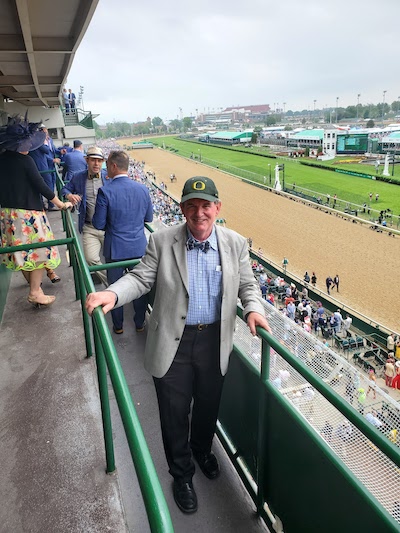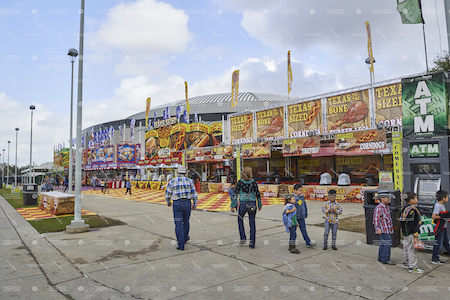The Houston Livestock Show & Rodeo was the first big, national client for Greg Flakus’ GF Strategies. He was hired in 1997 to wean its 110 commercial concessionaires from the historical flat rate per foot charge for space to 15 percent of the gross, using a sales tracking system he had refined for fairs.
The Houston Rodeo also counts on 35,000 volunteers to operate its 20-day event.
Flakus has fine-tuned his reporting system at 53 fairs in 20 states. Houston was the first to utilize all volunteers to help him.
His system involves hiring the staff on site, training them at set up and overseeing them as his paid employees or letting the show pay them, whichever worked for the client. The Houston fair had already advised concessionaires to come armed with a cash register that had all the required features. If not, the fair would provide one.
Those cash register requirements included:
- Non-resetting grand total, so it could not go back to zero.
- No-sale counter, if instead of hamburger for $5, they the hit no sale key, it registered.
- Transaction counter, meaning every time you ring up a sale, that’s a transaction. At the end of day you might have 400 transactions, totaling $4,000, and averaging $10 per. That is compared to the menu pricing.
- A clearly visible window on the register so the customer (and volunteer scouts) can see what you are ringing up. If the scouts saw too many zeros in the window, the appropriate action would be taken.
Arriving in Houston, he went directly to Wagner’s office.
“Where are my helpers?”
“What do you mean? Don’t you know we’re an all-volunteer organization?”
“Okay, so where are you going to get me these volunteers?”
“Meet with our commercial exhibits chair (Bill Yates) tomorrow morning at 8 a.m.; he will have 10 people there in his office ready to work with you”
The next morning, there they were. Not only were there 10 ready-to-go volunteers, but they were 10 accountants, probably the most knowledgeable crew he’d ever recruited. On the downside, they didn’t volunteer at the Houston Livestock Show to be accountants. That was their day job. Flakus guessed they’d rather judge livestock or arts exhibits or work with the kids. He assumed he had 10 reluctant volunteers.

The first task was to go around the midway and take openings on all the registers, getting ready for opening day. The unenthusiastic volunteers got the job done quite well, but bringing information back to a musty, windowless office just didn’t seem like fair-time work.
Over the next few days, sales numbers started coming in. They had a master excel spreadsheet with year-to-year on each stand. One of his volunteers suddenly says:
“We have some stands up 80 percent over last year; how can that be?”
“I don’t know. Maybe they raised their prices 80 percent, but I doubt it.”
The volunteers started getting it, “that we were there to collect more revenue for the show,” Flakus said. “They really dug in.”
Tom Witanik, who’s still a friend of Flakus’ to this day, was the ‘Z’ team captain, because on the bottom of the register tape is a Z reading which gives you the continuing gross total, day to day and all during the show.
“Two days in, I face my first challenge from Goodes Barbecue, a longtime, well-known BBQ restaurant in Houston. They were way off from what should be showing. Others were up and they were down,” Flakus recalled.
“We call Goodes manager in. He’s very understanding, has a reason for why it might happen, and corrected it apparently by getting different people operating the cash part of the business. The next day everything skyrockets,” Flakus said.
After seven 10-hour days, and the fair less than half over, Flakus was exhausted. That’s when he saw another side of volunteering at Houston Rodeo. One of his volunteers drug him out of the office to see George Strait perform at the rodeo. “He had two really good tickets. I still remember George getting on his horse and riding around the Astrodome and high-fiving people as he rode off and exited out of his show. It was incredible.”
Somewhere in the middle of the show, Wagner tells Flakus it might be a good idea to bring in another bank of 10 volunteers to finish the run.
“Are they complaining?”
“No, I just thought they might want to do something else.”
“Let’s ask them.”
To a person, they declined to be reassigned. They were into the system, like the Problem Box. That’s where they kept the register tapes that had lots of overrings, too many no-sales, or gaps in the tapes.
By Day 12, sales are going really well. Weather was good.
In the end, Houston Rodeo set a record attendance and final food and soft drink sales were up 28 percent from $3.5 million the year prior.
“I was proud; it was fun to see. It was a job I was not expecting.”
LESSONS LEARNED:
• Always be clear on exactly what is going to happen when you work with a client. “If I had asked the right questions, I would have known beforehand I would be working with volunteers. I could have sent a job description in advance,” Flakus said.
• When working with volunteers, try to make the job they are doing as fun as you can. “What they loved was when they did find someone who wasn’t doing it properly, going through tapes and being detectives.”
• Learn a little bit about each volunteer – family, grandkids, hobbies – “We had Texas Longhorns and Texas Aggies in there. We had some interesting discussions about football.”
• Find a way on the last day to do a celebration, before everyone goes home.
At the end of the fair, Flakus provided a report on how to improve sales beyond using cash registers, such as simplified menus, and good signage (there were handwritten signs everywhere, no standardization). “Signage sells.” He volunteers that advice. — Based on a true story as told to Linda Deckard
Photos: Food vendors at the Houston Livestock Show & Rodeo; Greg Flakus at the Kentucky Derby.
